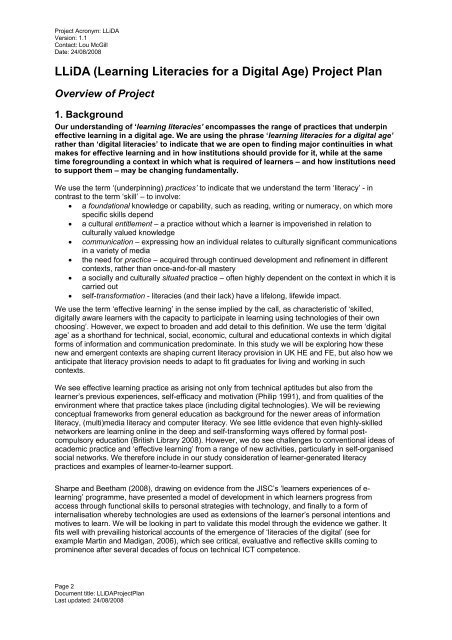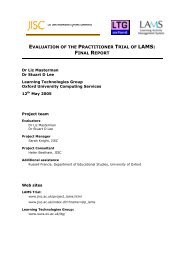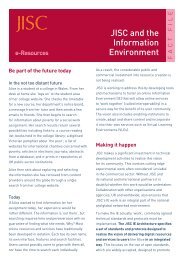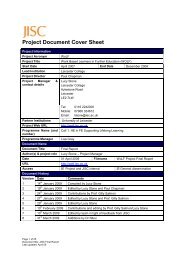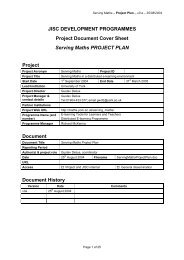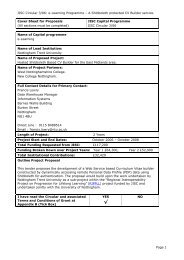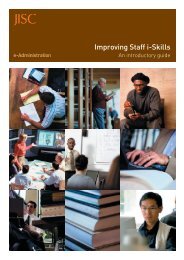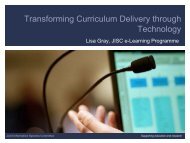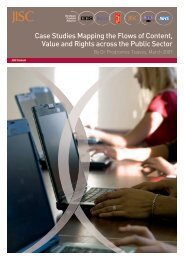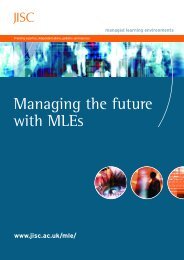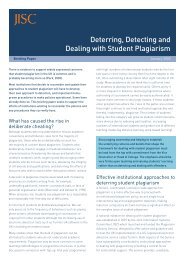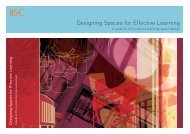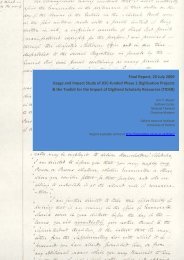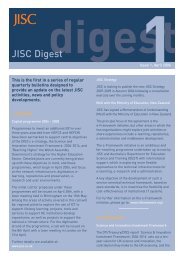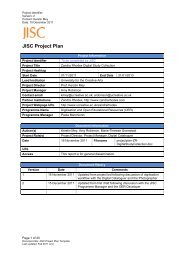LLiDA Project Plan - Jisc
LLiDA Project Plan - Jisc
LLiDA Project Plan - Jisc
Create successful ePaper yourself
Turn your PDF publications into a flip-book with our unique Google optimized e-Paper software.
<strong>Project</strong> Acronym: <strong>LLiDA</strong><br />
Version: 1.1<br />
Contact: Lou McGill<br />
Date: 24/08/2008<br />
<strong>LLiDA</strong> (Learning Literacies for a Digital Age) <strong>Project</strong> <strong>Plan</strong><br />
Overview of <strong>Project</strong><br />
1. Background<br />
Our understanding of ‘learning literacies’ encompasses the range of practices that underpin<br />
effective learning in a digital age. We are using the phrase ‘learning literacies for a digital age’<br />
rather than ‘digital literacies’ to indicate that we are open to finding major continuities in what<br />
makes for effective learning and in how institutions should provide for it, while at the same<br />
time foregrounding a context in which what is required of learners – and how institutions need<br />
to support them – may be changing fundamentally.<br />
We use the term ‘(underpinning) practices’ to indicate that we understand the term ‘literacy’ - in<br />
contrast to the term ‘skill’ – to involve:<br />
• a foundational knowledge or capability, such as reading, writing or numeracy, on which more<br />
specific skills depend<br />
• a cultural entitlement – a practice without which a learner is impoverished in relation to<br />
culturally valued knowledge<br />
• communication – expressing how an individual relates to culturally significant communications<br />
in a variety of media<br />
• the need for practice – acquired through continued development and refinement in different<br />
contexts, rather than once-and-for-all mastery<br />
• a socially and culturally situated practice – often highly dependent on the context in which it is<br />
carried out<br />
• self-transformation - literacies (and their lack) have a lifelong, lifewide impact.<br />
We use the term ‘effective learning’ in the sense implied by the call, as characteristic of ‘skilled,<br />
digitally aware learners with the capacity to participate in learning using technologies of their own<br />
choosing’. However, we expect to broaden and add detail to this definition. We use the term ‘digital<br />
age’ as a shorthand for technical, social, economic, cultural and educational contexts in which digital<br />
forms of information and communication predominate. In this study we will be exploring how these<br />
new and emergent contexts are shaping current literacy provision in UK HE and FE, but also how we<br />
anticipate that literacy provision needs to adapt to fit graduates for living and working in such<br />
contexts.<br />
We see effective learning practice as arising not only from technical aptitudes but also from the<br />
learner’s previous experiences, self-efficacy and motivation (Philip 1991), and from qualities of the<br />
environment where that practice takes place (including digital technologies). We will be reviewing<br />
conceptual frameworks from general education as background for the newer areas of information<br />
literacy, (multi)media literacy and computer literacy. We see little evidence that even highly-skilled<br />
networkers are learning online in the deep and self-transforming ways offered by formal postcompulsory<br />
education (British Library 2008). However, we do see challenges to conventional ideas of<br />
academic practice and ‘effective learning’ from a range of new activities, particularly in self-organised<br />
social networks. We therefore include in our study consideration of learner-generated literacy<br />
practices and examples of learner-to-learner support.<br />
Sharpe and Beetham (2008), drawing on evidence from the JISC’s ‘learners experiences of e-<br />
learning’ programme, have presented a model of development in which learners progress from<br />
access through functional skills to personal strategies with technology, and finally to a form of<br />
internalisation whereby technologies are used as extensions of the learner’s personal intentions and<br />
motives to learn. We will be looking in part to validate this model through the evidence we gather. It<br />
fits well with prevailing historical accounts of the emergence of ‘literacies of the digital’ (see for<br />
example Martin and Madigan, 2006), which see critical, evaluative and reflective skills coming to<br />
prominence after several decades of focus on technical ICT competence.<br />
Page 2<br />
Document title: <strong>LLiDA</strong><strong>Project</strong><strong>Plan</strong><br />
Last updated: 24/08/2008


